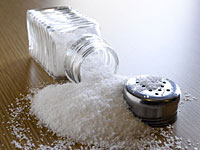



- Viagra
- Sildenafil Citrate (TP)
- Sildenafil Citrate TEVA
- Tadalafil TEVA
- Tadalafil ACCORD
- Tadalafil DAILY
- Vardenafil TEVA
- Vardenafil ZYDUS
- Sildenafil Citrate (GS)
- Cialis
|
Huh? Low-Salt Diet Ups Risk of Fatal Heart Attack?
2011-05-04
|
Huh? Low-Salt Diet Ups Risk of Fatal Heart Attack?

TUESDAY, May 3, 2011 (Health.com) — Doctors and public health officials have been telling us for years that eating too much sodium can increase the risk of heart attack or stroke by raising blood pressure to unsafe levels. So how to explain a new study that suggests low salt intake actually increases the risk of dying from those causes?
The study, which followed 3,681 healthy European men and women age 60 or younger for about eight years, also found that above-average sodium intake did not appear to up the risk of developing high blood pressure (hypertension) or dying of a heart attack or stroke.
The findings, reported in the May 4 issue of the Journal of the American Medical Association, certainly seem counterintuitive, especially in light of the ongoing public-health campaign to lower sodium consumption across the U.S. by urging restaurants and food manufacturers to curtail their use of the ingredient.
In fact, says Jan A. Staessen, MD, the senior author of the study and the head of the hypertension laboratory at the University of Leuven, in Belgium, the findings “do not support the current recommendations of a generalized and indiscriminate reduction of [sodium] intake at the population level.”
Salt lovers shouldn’t break out their shakers just yet, though. A closer look at the findings shows that they’re not as out of line with the low-sodium mantra as they might seem.
For starters, the participants’ sodium consumption was gauged by measuring the sodium content of their urine over just one 24-hour period at the beginning of the study. Although this method is considered the gold standard for estimating sodium intake, that lone urine test may not provide an accurate snapshot of the participants’ everyday intake over the full eight-year study, as the researchers themselves note.
Even more important, the participants had blood pressure in the normal range at the beginning of the study and were white, relatively young, and slimmer on average than the typical American. Past research has shown, however, that people with hypertension, blacks, older people, and heavier people tend to react more negatively to sodium.
“Maybe it would be better to pinpoint specific subgroups,” says Jerome Fleg, MD, a medical officer in the division of cardiovascular sciences at the National Heart, Lung and Blood Institute, in Bethesda, Md. “This is probably not the group that would get the biggest bang for the buck in terms of restricting sodium intake.”





